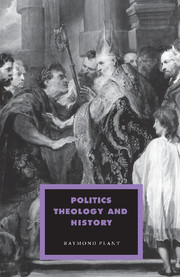Book contents
- Frontmatter
- Contents
- Preface
- 1 Liberal society and political theology
- PART I THE POSSIBILITY OF POLITICAL THEOLOGY
- 2 Theology and politics: context, community and prophecy
- 3 God, history and political theology
- 4 Totality, finitude and history
- 5 Narratives and foundations
- 6 Natural law and natural order
- PART II THE SITE OF POLITICAL THEOLOGY
- PART III LIBERALISM, RELIGION AND SOCIAL UNITY
- Select bibliography
- Index of names
- Index of subjects
- CAMBRIDGE STUDIES IN IDEOLOGY AND RELIGION
3 - God, history and political theology
Published online by Cambridge University Press: 23 November 2009
- Frontmatter
- Contents
- Preface
- 1 Liberal society and political theology
- PART I THE POSSIBILITY OF POLITICAL THEOLOGY
- 2 Theology and politics: context, community and prophecy
- 3 God, history and political theology
- 4 Totality, finitude and history
- 5 Narratives and foundations
- 6 Natural law and natural order
- PART II THE SITE OF POLITICAL THEOLOGY
- PART III LIBERALISM, RELIGION AND SOCIAL UNITY
- Select bibliography
- Index of names
- Index of subjects
- CAMBRIDGE STUDIES IN IDEOLOGY AND RELIGION
Summary
Glorious things of thee are spoken
Zion city of our God.
(Psalmist)It belongs to the very nature of the state that it is not and cannot become the Kingdom of God.
(Barth)Nihil Solidum. Nihil Stabile.
(Augustine)In the previous chapter I looked at the way in which the prophetic tradition of the Old Testament could be taken as uniting the universal and the particular: the nature of God and the world of politics with all its particularity. As we have seen, scholars are engaged in controversy about exactly those aspects of prophecy which bear most closely on this issue. I have now to turn to the idea of a theology of history as a way of seeking a mediation between religious belief and politics. Obviously states, political communities and political societies are historical products and achievements. They have a history, and an under-standing of this history is vital to the understanding of the present structure and nature of these institutions. This also means that states and political communities, and the values and principles, beliefs and attitudes which play a role in holding them together, are highly specific and particular historical creations and, therefore, one aspect of the dilemma of relating the universal and the particular in theology is the relationship between God and history. One way in which what Professor Forrester calls the classical tradition in theology has sought to link these is through a theology of history: an account of God's relationship to the historical process, a relationship which gives that process a general meaning and rationality.
- Type
- Chapter
- Information
- Politics, Theology and History , pp. 44 - 78Publisher: Cambridge University PressPrint publication year: 2001

